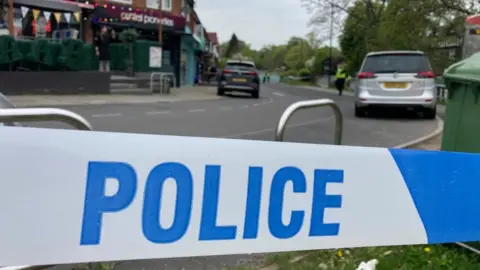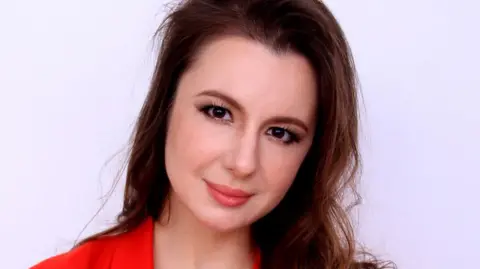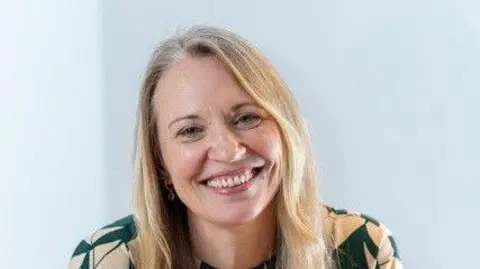'Otley Run attack shows misogynistic violence is growing'
 BBC
BBCBefore two women were shot with a crossbow in Headingley two weeks ago, Owen Lawrence – the suspected attacker – posted a hate-filled online "manifesto" on Facebook.
He detailed plans for "The Otley Run Massacre" and listed "students, nightclub goers", "neurotypicals" and "police" among his targets.
The post described the planned violence as "terrorism, revenge and misogynistic rage".
In the two weeks since the attack, residents, police, politicians and experts have been discussing how future incidents of this nature can be avoided.
Earlier this week, mayor of West Yorkshire Tracy Brabin called for tougher laws around crossbows, and Leeds Central and Headingley MP Alex Sobel said he supported more security around the Otley Run pub crawl.
But what about the ideology behind Lawrence's manifesto?
'It could have happened anywhere'
Dr Anna Kruglova, a lecturer in terrorism studies from the University of Salford, says we need to be concerned about a rise in "misogynistic violence".
"We should be mindful of this phenomenon being again on the rise," she says.
"It is a random attack in the sense that it can happen anywhere. You have disenfranchised, upset and hateful people. So unfortunately it could have happened in any corner of the UK or elsewhere.
"But it's hard to estimate the level of threat. It's not an organised phenomenon. It's a lone-wolf attack. It's not something that is inspired by a particular organisation."
Dr Kruglova studies the "manosphere", a term used to describe online communities that promote anti-feminism, misogyny and hateful ideas about women, trans and non-binary people.
She says: "The manosphere is not an organised movement. That's kind of a loose group of people who are hating women and some of them, not all of them, will be willing to take this further and become violent.
"There's been a growing body of research and interest from all kinds of communities, practitioners and governments looking into this.
"So it does seem like gender-based violence, misogynistic violence is growing, or has become more and more concerning in the last few years."
 Dr Anna Kruglova
Dr Anna KruglovaPsychologist Leona Deakin started her career with West Yorkshire Police. She says it is easy to think these ideas are "silly" until they become violent reality.
"If we're not in a community, or close to a community and their beliefs, then it's easy to think it's a small group of people being a bit silly until something like this happens. Then that makes us all take a closer look," she says.
"There is a community out there for men who feel they are isolated or rejected by society and more immediately by women and girls."
Some of these men call themselves "incels", which stands for "involuntarily celibate".
Ms Deakin explains why this ideology can be attractive.
"There is a theory in that community that 80% of women are only attracted to about 20% of men, and those men are highly attractive and usually very wealthy.
"So if you're a young man who sees himself as not so attractive, and doesn't have much money or the capacity to earn much money, then you start to feel quite aggrieved.
"And social media is like an echo chamber, so you find one person who agrees with your sense of isolation and frustration, and then you find a dozen of them and then hundreds of them and that has a huge validation impact on the human brain.
"We start to think we must be right because everyone I'm talking to online agrees with me, so this must be correct."
 Leona Deakin
Leona DeakinA government report by the Commission for Countering Extremism, "Predicting harm among incels (involuntary celibates)", concluded that men who fell into these groups were in need of mental health support more than counter terrorism interventions.
The report studied 561 men and concluded that there was likely to be tens of thousands of incels across the globe.
It found these men made up a "relatively small proportion" of the number of cases referred to the anti-terrorist government organisation Prevent (77 in total, or 1.2% of all referrals).
Dr Kruglova says incels are not violent generally but suffer from mental health issues and very low self-esteem.
"It's more of a psychological and personal problem," she says.
"A lot of these people don't need to be referred to Prevent [government anti-terrorism organisation] or be interviewed by police forces, they need someone to share their concerns and pain and problems and be listened to and probably be shown the situation is not as dire as they see it.
"But then unfortunately there is also someone who is willing to take it further and use violence as a way to address their issues."
Are our young boys 'robust'?
Ms Deakin says the solution, therefore, is not about security but society.
"We need better role models of what a good man looks like," she says.
"So, a kind, compassionate, emotional man, to counter these ideas that men have to be attractive, strong, in control, wealthy, all of those stereotypical ideals.
"The family and schools are key places because young, teenage boys, 15/16 is where we need to start the process of avoiding falling down this rabbit hole.
"Role modelling from dads, uncles, big brothers talking about their emotions. Talking about what makes a good relationship, that it is about partnership and love and respect.
"But we need to make sure young boys are robust in the face of disappointment.
"Do your boys understand how to bounce back from disappointment? Do they understand resilience? Do they feel a deep sense of self-worth, do they feel loved for who they are?"
Listen to highlights from West Yorkshire on BBC Sounds, catch up with the latest episode of Look North.
